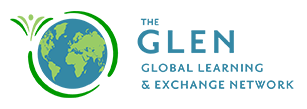Intention
Brain science and social psychology are lending increasing validity to design thinking co-operative approaches to process consulting and collaboration. GLEN Exchanges in the Fall of 2017 ignited interest in more extended exploration and study in 2019. Our hope is to identify transformational ways to conceive of, design, and lead collaborative efforts with diverse stakeholder groups, especially those who are more marginalized. This will involve (1) exploring what we think we know and what we believe is possible through this six-session Exchange series; (2) digging into the research, and (3) harvesting insights from learnings in these Exchanges in our Neuroscience of Collaboration & Design Collaboration, to create mini-publications and inspire Learning Journeys for more in-depth study.
Key Questions for Exploration
- Overarching Question: How can we consciously evolve the human brain (throughout the body) so that we can talk better together with diverse stakeholders about complex issues?
- How can we pay attention to and understand our personal interiors such that we can handle complexity, respond to overwhelm and hijacking, and not be distracted and upset by waves of intrusive media and work demands?
- How can people with different worldviews, ideologies, and perspectives converse constructively, even compassionately?
- How can diverse stakeholders with multiple identities (race, ethnicity, gender, sexual orientation, socioeconomic status, education, organization sector or function) be at the same table and engage one another in constructive and meaningful ways?
- How can we create receptive and generative fields within, among, and around us when complexity outstrips our ability to understand what is going on, let alone interact constructively to respond effectively?
- What basic or foundational beliefs or theories of change seem to underlie the majority of the current theories and methods of change? How does current knowledge about human neuropsychology support or challenge these beliefs or theories of change?
- How can we make a transformational step change in collaborative change processes as a whole, so they are designed and conducted in ways that help us respond to complex issues with diverse stakeholders?
Exchange Design
We propose that the Neuroscience of Collaboration & Design GLEN Collaboration start with a six-session Exchange series. These Exchanges will follow the following design:- Review the purpose of The Neuroscience of Collaboration & Design, GLEN Collaboration, the overarching question of the Collaboration, conversation guidelines. (5 minutes)
- Silent guided meditation. (3 minutes)
- Check-ins (name, location, evocative questions that will differ by Exchange; the first question would relate to interest in the Collaboration) (or use breakout groups and simultaneous note taking in Google docs.) (20 minutes)
- Presentation regarding the topic of the Exchange. (15 minutes)
- Few moments of quiet to reflect on a question and then a go around (or use of break out groups and simultaneous note taking in Google docs.) (25 minutes)
- Presentation regarding foundational and transformational practices, skills and design principles. (10 minutes)
- Share conversation question and finish with one minute of silence.
- A go around (or use of breakout groups and simultaneous note taking in Google docs.) (20 minutes)
- Share takeaways or questions to explore. Suggest readings and explorations between each session. (20 minutes)
- What we mean by “space;”
- Four influential brain networks and the impact of contemplative practices on them;
- Introduce an initial, short list of foundational and transformational practices, skills and design principles intended to change the brain for good;
- Explore how we can pay attention to and understand our personal interiors such that we can handle complexity, respond to overwhelm and emotional hijacking, and not be distracted and upset by waves of intrusive media and work demands
- Worldviews that divide us;
- Impact of conflicting worldviews on the brain and body along with our perceptions, thoughts, and behavior;
- Introduce an initial, short list of foundational and transformational practices, skills and design principles intended to help us care about and learn with others;
- What each of us does or could do to transform the space between us and our worldviews in order to work together to effectively solve tough issues
- Equality and equity;
- Levels and dimensions of racial and gender bias: personal, interpersonal, institutional, and structural;
- How these levels and dimensions undermine equitable and meaningful collaboration;
- Introduce an initial, short list of foundational and transformational practices, skills and design principles intended to help us care about and learn with others;
- What each of us does or could do to transform the space between us and our identities in order to work together to effectively to solve tough issues
- Various views on “fields” and how they get created;
- Introduce an initial, short list of foundational and transformational practices, skills and design principles intended to help us create receptive and generative fields;
- What internal and external states and skills co-create receptive and generative fields
- Current approaches to or models of change;
- Worldviews and theories of change underlying these approaches and models;
- Whether and how current knowledge about human neuropsychology and field theory supports or challenges these approaches;
- How our approaches to change could usefully change
- Whether these practices, skills and design principles could help us consciously evolve the human brain (throughout the body) so that we can talk better together with diverse stakeholders about complex issues;
- What transformational practices you have tried and what has been the impact;
- What we are learning about the next generation of collaborative processes;
- What’s next for this Collaboration.
- February 12th / Exchange Session 1: Change the Brain for Good (space inside)
- March 12th / Exchange Session 2: A. Care about and Learn with Others (space between us and our world views)
- April 16th / Exchange Session 3: B. Care about and Learn with Others (space between us and our identities)
- May 14th / Exchange Session 4: Create Receptive and Generative Fields within, among and around Us
- June 18th / Exchange Session 5: Map Current Approaches to or Models of Change
- July 30th / Exchange Session 6: Synthesize Transformational Practices, Skills and Design Principles
- August 19th / Exchange Session 7: Document and Share What We Learned

